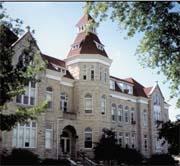
Carroll College, a school similar to Lawrence University, has been at the center of student and faculty protests over recent proposed changes to the academic offerings of the school. The administration has been moving away from the liberal arts education. (www.webdev.cc.edu)
Carroll College, located in Waukesha, Wis., has recently been the setting for many faculty and student protests in response to proposed changes to the school’s academic offerings.The Feb. 20 issue of Carroll’s student newspaper, The New Perspective, outlines these proposed changes, which include eliminating faculty positions and courses in the humanities and fine arts, and allocating additional resources to the sciences, business administration and economics, health sciences, and law enforcement.
Another larger modification would include restructuring the college into two parts: a liberal arts school and a professional training school.
While Carroll College is similar to Lawrence University (both are small Wisconsin colleges) Lawrence has stayed firmly committed to liberal arts learning.
Although LU President Rik Warch was unable to comment specifically on the events at Carroll, he offered insight as to how Lawrence has been able to retain this commitment.
“We believe that liberal education is the best preparation for a student’s life and career, providing the intellectual and personal attributes that will enable each individual to succeed in a variety of vocational and personal choices,” he said.
Lawrence has been able to commit to liberal arts because of its strong foundation, Warch said. “Through the collective actions of administrators and faculty over many decades, [Lawrence] has shaped and defined itself as a place committed to liberal learning,” he said.
He cited past contributions, such as the elimination of certain professional programs in the 1920s and ’30s and the establishment of the Freshman Studies program.
Currently, Warch explained, Lawrence is at a good operating level. “We have the advantage of strong alumni support, a reasonably strong endowment, though not where it needs to be, and strong admissions and retention results,” he said.
Although the search is on for a new president, Warch believes that Lawrence will remain committed to liberal arts learning. “I suppose the next Lawrence president may have a different opinion from mine-he or she will obviously have different opinions and approaches on some matters-but I would be surprised if the trustees would select a president who did not embrace the place and purposes of liberal education,” he said.
“At the end of the day,” Warch added, “I think the question [as to how Lawrence remains committed to liberal arts learning] can be answered by noting that the administration, faculty, staff, students, and alumni of Lawrence have a shared sense of purpose, which has seen us through difficult times in the past and which I believe will persist into ourfuture.
